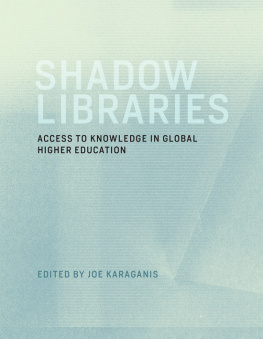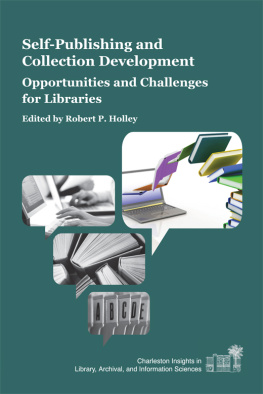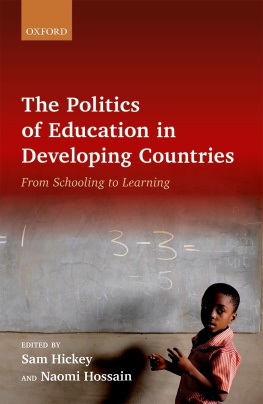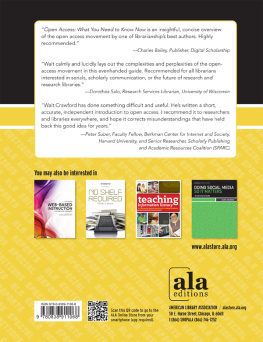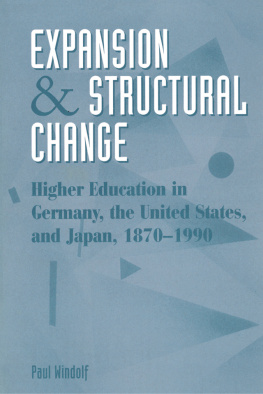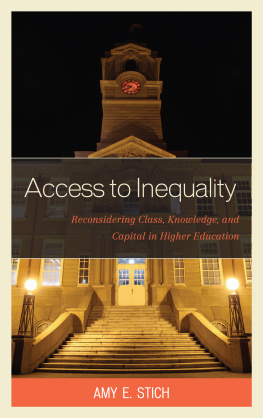Shadow Libraries
Access to Knowledge in Global Higher Education
Edited by Joe Karaganis
The MIT Press
Cambridge, Massachusetts
London, England
International Development Research Centre
Ottawa Cairo Montevideo Nairobi New Delhi
The American Assembly at Columbia University
New York
2018 Massachusetts Institute of Technology
This work is licensed under a Creative Commons Attribution-NonCommercial 4.0 (CC BY-NC 4.0) International License.

A copublication with
International Development Research Centre
PO Box 8500
Ottawa, ON K1G 3H9
Canada
and
The American Assembly at Columbia University
475 Riverside Drive, Suite 456
New York, NY 10115
USA
www.americanassembly.org
The research presented in this publication was carried out with the financial assistance of Canadas International Development Research Centre. The views expressed herein do not necessarily represent those of IDRC or its Board of Governors.
This book was set in ITC Stone Serif Std by Toppan Best-set Premedia Limited. Printed and bound in the United States of America.
Library of Congress Cataloging-in-Publication Data
Names: Karaganis, Joe, editor.
Title: Shadow libraries : access to educational materials in global higher education / edited by Joe Karaganis.
Description: Cambridge, MA : The MIT Press ; Ottawa, ON : International Development Research Centre, [2018] | Includes bibliographical references and index.
Identifiers: LCCN 2017033629 | ISBN 9780262535014 (pbk. : alk. paper)
eISBN 9780262345682
Subjects: LCSH: Scholarly publishing--Economic aspects--Developing countries. | Scholarly electronic publishing--Developing countries. | Piracy (Copyright)--Developing countries. | Intellectual property infringement--Economic aspects--Developing countries. | Copyright--Electronic information resources--Developing countries. | Photocopying--Developing countries. | Open access publishing--Developing countries. | Communication in learning and scholarship--Technological innovations--Developing countries. | Education, Higher--Developing countries.
Classification: LCC Z286.S37 S48 2018 | DDC 070.5--dc23 LC record available at https://lccn.loc.gov/2017033629
ePub Version 1.0
Introduction: Access from Above, Access from Below
Joe Karaganis
In 2009, a Russian neuroscience student named Aleksandra Elbakyan started a masters thesis on biometric scanning at Kazakhstan University. Like many students and academics outside U.S. and European universities, Elbakyan had little access to research on her topic: her university didnt subscribe to the international databases that contain most of the worlds scientific articles. Like many scholars in similar positions, she relied on material shared by colleagues based at or visiting universities that do provide access. Finding articles under such circumstances was haphazard and slow. For the most part, Elbakyan obtained them through personal contacts or professional networks that tried to match individual requests for articles with copies.
Unauthorized digital copies of books and articles began to be aggregated into online collections in the early 2000s. In most cases, these collections were smallpersonal collections of scanned materials shared via listservs and social media accounts. In a few cases, these collections grew into larger, curated archivesthe Russian-language Library Genesis site (usually called LibGen), the Spanish-language Hansi library, and the social theory archive Aaaaarg (yes, the pirate sound) were early examples. Together, these methods of collecting and sharing enabled a slow osmosis of scholarly literature from more privileged to less privileged students, researchers, and universities. Elbakyan found a way to accelerate the process.
In 2011, Elbakyan launched Sci-Hub, a search and download service for journal articles. Sci-Hub was connected to LibGen, which by then had grown into a mostly academic, mostly unauthorized archive of over half a million books and articles. By most accounts, Elbakyans innovation was to mobilize university colleagues to share not individual articles, but virtual private network credentials for campus intranets in Western universities, which enabled access to the major journal databases.
The core method was simple but ingenious. On Sci-Hub, a search for an article triggered a search of LibGen. If the article wasnt found in LibGen, Sci-Hub searched the major journal databases using the acquired credentials. When the user downloaded a copy, Sci-Hub simultaneously uploaded a copy to LibGen, ensuring that the next request for the document could be met from within the collection. By 2016, Sci-Hub/LibGen had grown to around fifty million articles. Over a six-month period in 20152016, it had over 28 million downloads ().
Because Sci-Hub circumvented the paywalls on which much of the scientific publishing world was built, the major publishers were eager to shut it down. In late 2015, Elsevier, whose ScienceDirect database was a major source for Sci-Hub, obtained an injunction in a U.S. court targeting the service, LibGen, several other unauthorized book archives, and Elbakyan personallyone of the only publicly identified individuals in this world of shadow libraries. In early 2017, the outcome was still uncertain: Sci-Hub had been forced to switch domains twice and had disabled its direct search capabilities. The LibGen site had been up and down several times in the preceding year. Although the Russian services that hosted Sci-Hub and LibGen remain relatively insulated from U.S. injunctions, the sites depend on other parts of the Internet that are more vulnerable to legal pressuredomain name registrars, search engines, and Internet service providers especially. When these companies comply with injunctions, they can make life difficult, though rarely impossible, for the targeted services.
As everyone from Elbakyan to Elsevier knew, however, Sci-Hubs importance was not its permanence as a service but its status as a proof of concept. Its core archive of fifty million articles was freely available and its basic search and archive features easily replicated. Elbakyan herself estimated that the full archive has been copied many times, moving well beyond the network of Russian academics and hackers who formed the core community behind LibGen and many of the other top-level archives. Although Elbakyan made no significant effort to hide her identity and may face arrest on charges of copyright infringement, the larger network of pirate archivists behind the other services has kept a much lower profile.
The Sci-Hub story made headlines as the authors and researchers involved in this book were wrapping up our study of this rapidly changing knowledge ecosystem. Shadow Libraries explores this reorganization of the flow of educational and research materials as they pass from authors to publishers and libraries, to students and researchers, and from comparatively rich universities to poorer ones.
From the top down, Shadow Libraries explores the institutions that shape the provision of these materials, from the formal sector of universities and publishers to the broadly informal ones organized by faculty, copy shops, student unions, and students themselves. It looks at the history of policy battles over access to education in the postWorld War II era and at the narrower versions that have played out in relation to research and textbooks, from library policies to book subsidies to, more recently, the several open publication models that have emerged in the higher education sector.

